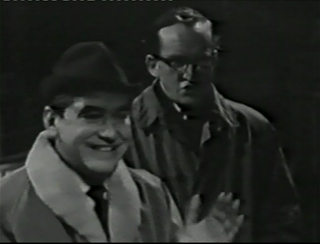This week's Hancock (The Writer) is another from the pen of Terry Nation, but it's nowhere near the quality of the last episode of his featured here, The Night Out. In fact, it's probably the weakest I've seen from this series, its only real interest coming from speculating how much of it was inspired by Nation's own experience of being a TV comedy writer.
The episode begins with Hancock entering a pub and failing for some time to get served. By the time he manages to alert the stony-faced landlord (Stuart Saunders) to his presence, he's managed to smash all the empties he's brought back.
 |
| "It's what you might describe as a smashing experience" |
Hancock peruses the wine list and examines a bottle of Chateau Latour ("you've got to hand it to those Italians, they do know how to make a decent bit of plonk. It's something to do with the feet, I suppose") - then hands it back and orders a small brown ale. After a horribly laboured and overlong bit where Hancock delivers a monologue to camera celebrating the joys of the English pub, intercut with shots that contradict him (e.g. "...to sit beside the warmth of a beckoning log fire" - cue shot of a grimy electric fire), he retires to the lounge to watch TV.
On the box is a variety show compered by Pete Murray, with special guest Jerry Spring, the biggest comedian on TV (John Junkin). Jerry's a typical smarmy early 60s comedian complete with mid-Atlantic accent, and Hancock doesn't hold back in his scorn for the man and his ancient jokes: "Bob Hope, 1945, word for word!" What our hero hasn't realised is that the two men he's loudly disturbed in the lounge are Jerry himself and his manager (Francis Matthews).
On discovering the identity of his companions Hancock clumsily backtracks in characteristic style and makes out he's actually Jerry's biggest fan ("I can't understand this, a minute ago you were there on the screen, and now you're here!"). Given how this Hancock series has gone down in the annals of TV history there's an uncomfortable irony in hearing our hero tell the comedian "they're not writing for you properly". Jerry, who's used to being surrounded by yes-men like Matthews, is interested to hear Hancock's new ideas for his act. Predictably enough, these are even worse than his current material, with Hancock especially insistent on the importance of a funny walk ("It's only the first step, of course - you'll need funny hats, new jokes, dramatic recitations...")
 |
| "The penguin" |
Hancock's first day on the job sees him donning a ridiculous new outfit and the same quasi-American accent as Jerry and his crew. For no apparent reason he launches into a rendition of "Brother, Can You Spare a Dime?" and then unleashes the full awfulness of his ideas: "These 31 elephants come rushing out on to the stage..."
Later, at home, Hancock (in Noel Coward mode) attempts to pull a script together. The main problem is that he's unable to think of a single joke.
He finally hits on a foolproof plan when he remembers he's got a box of Christmas crackers in the cupboard.
Next morning Jerry comes to read the script, which is terrible apart from one funny bit - Hancock's spelling of trousers. Despite Hancock's attempts to convince him there are plenty more great ideas (standing on his head's a big one), Jerry decides to dispense with the aspiring writer's services.
 |
| "A-powder your face with sunshine, a-give us a great big smile..." |
The fatal problem with The Writer is that Nation's own material here isn't actually any better than what he's mocking. It's a particularly frustrating episode as, more than any of the others I've seen from the ATV series, it feels like the sad ghost of a Galton and Simpson episode. The dialogue seems too much of a conscious effort to ape their style, and while it edges close to being funny, it never quite gets there. Hancock seems to be flagging by this stage too - it's truly shocking how much he's aged even since the first episode of the series - and he's not able to rescue the dodgier lines with his usually exquisite timing. There's one more ATV episode after The Writer, but this is the last one I've got. It's been a wildly uneven series, and this feels a pretty sad way to leave it. Next for Hancock would be the indifference that greeted the release of The Punch and Judy Man, and a tragic journey downhill from there.
Incidentally, The Writer featured on the cover of this week's TV Times. You can read the whole issue here
Incidentally, The Writer featured on the cover of this week's TV Times. You can read the whole issue here




















































